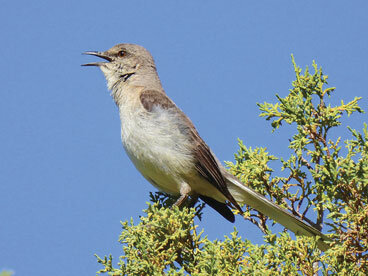
This week’s Bird of the Week, compliments of the Weminuche Audubon Society and Audubon Rockies, is the northern mockingbird.
Until it opens its mouth to sing, this is not a flashy bird. Northern mockingbirds are slender, medium-sized birds, grayish above and white below with a long slender bill and long tail. Large white wing patches, visible in flight, appear as a small white mark when the wings are folded.
The scientific name, mimus polyglottis, which translates as many-tongued mimic, describes the attribute for which this bird is best known. Northern mockingbirds add parts of the songs of neighboring birds and other sounds they hear including car alarms, sirens and musical instruments to their varied repertoire.
In defense of territory and to attract a mate, a male may sing his ever-changing song all through the day and into the night. Each phrase in the lineup is usually repeated three to five times before it is replaced. In his exuberance, he may leap into the air and flap his wings while singing. Females also sing, but more quietly and less frequently.
Northern mockingbirds aggressively defend their territories, nests and young, keeping an eye out for intruders from high perches on tall shrubs, poles or utility lines. Pairs are believed to maintain long-term bonds. They will chase and dive at anything perceived to be a threat near the nest including predators, pets, other birds and people.
Originally a bird of the southern states, today the northern mockingbird is a resident bird across much of the United States with some northern birds migrating to warmer areas in winter. They eat a variety of insects in summer and fruits in fall and winter. Their preference for living in open areas with shrubby undergrowth brings them into close contact with people in urban and suburban settings.
Although their entertaining songs are fun to hear, at times their noisy and aggressive ways get them into trouble with people and label them as pests.
For information on events, visit www.weminucheaudubon.org and www.facebook.com/weminucheaudubon/.